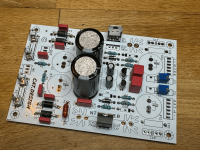How to use/connect the OREAD PCB (r04)
The circuit boards can be used with single supply or dual supply. For double supply, it is better to use resistor RB instead of R1 and R2. RB is not on the screen print of the current PCB version r04. Therefore, the following images show the position of RB if it is used.
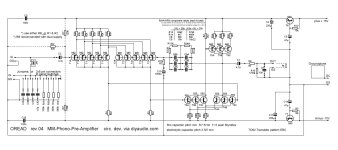
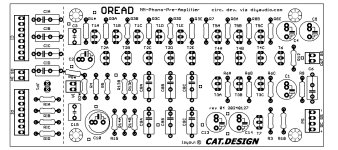
The next picture shows how power supply and ground are connected.
If the boards are installed in a housing together with other amplifier components, you should also use this grounding principle.
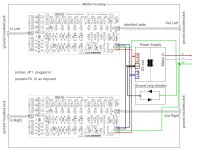
But, depending on the overall structure of the amplifier chain, it may possibly also work to simply interconnect GS and GC directly on the OREAD board.
(GS = signal ground, GC = chassis ground)
The circuit boards can be used with single supply or dual supply. For double supply, it is better to use resistor RB instead of R1 and R2. RB is not on the screen print of the current PCB version r04. Therefore, the following images show the position of RB if it is used.


The next picture shows how power supply and ground are connected.
If the boards are installed in a housing together with other amplifier components, you should also use this grounding principle.

But, depending on the overall structure of the amplifier chain, it may possibly also work to simply interconnect GS and GC directly on the OREAD board.
(GS = signal ground, GC = chassis ground)
Last edited:
Last edited:
power supply for the OREAD
There are some suggestions for power supplies for the OREAD earlier in this thread. (Post No. 147,148,150,188)
Here is mine.
For lower power devices like preamps, headphone amplifiers, etc. I usually use simple power supplies with TO220 regulator ICs.
Since I don't have any of my universal supply board left to house an OREAD in its own case, I plan on ordering some.
If anyone else would be interested in such a board, send me an email/PM.

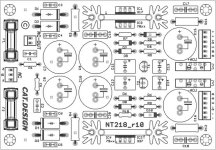

There are some suggestions for power supplies for the OREAD earlier in this thread. (Post No. 147,148,150,188)
Here is mine.
For lower power devices like preamps, headphone amplifiers, etc. I usually use simple power supplies with TO220 regulator ICs.
Since I don't have any of my universal supply board left to house an OREAD in its own case, I plan on ordering some.
If anyone else would be interested in such a board, send me an email/PM.



As always,
a great circuit board - universally applicable, but why not try something new/unknown? For example, the virtual battery, if it (absolutely) has to be an overkill!
The power requirement of the EQ is tiny, two batteries also do their job with flying colors.
Are there already positive or negative voices in the background? I still like OREAD without any reservations.
Greetings,
HBt.
a great circuit board - universally applicable, but why not try something new/unknown? For example, the virtual battery, if it (absolutely) has to be an overkill!
The power requirement of the EQ is tiny, two batteries also do their job with flying colors.
Are there already positive or negative voices in the background? I still like OREAD without any reservations.
Greetings,
HBt.
Dear catd,
I will gladly take two of your (PSU) boards again
😉.
HBt.
(would you like to get to work on a possible circuit board for the SUPRA2024 project?)
I will gladly take two of your (PSU) boards again
😉.
HBt.
(would you like to get to work on a possible circuit board for the SUPRA2024 project?)
I know.The power requirement of the EQ is tiny, two batteries also do their job with flying colors.
But I'm sure, when I want to use it, the batteries are empty. 😉
It is quite practical to have this universal board on hand if you want to quickly set up a small power supply.
For example, I have also used it for some self-made measuring devices.
To operate the OREAD alone, you can leave out some components, such as the heat sinks or the soft start, install smaller rectifiers, etc...then it's not overkill
Are there already positive or negative voices in the background? I still like OREAD without any reservations.
I haven't seen any.
Is there anything to see yet? a thread?.....SUPRA2024 project...
I studied this project along with several other DIY solutions and decided to go with this based on my quite limited knowledge. My current riaa is built on a NE5532 and a feedback loop riaa network from a news group article by Berndt Ludwig who is "famous" for improving on the Quad 405, by Peter J. Walker, amplifier. Others (D.C. Daylight) have honorably amended mr Ludwig's initial work on the 405. (sorry for that detour from the subject)
I've tried my luck with a tube construction, but never got it hum free and was put of by having to mind tube aging, heat and high voltages. I studied a rather complex fully balanced construction but didn't see any advantage as long as I only have a MM pickup. I was tempted to go into MC land by the Memphis MC1 riaa, even if the transformers and chokes are quite costly, when I found this OREAD construction with some similarities (in my uneducated eyes). So I ordered a set of PCB's from catd. Excellent service and value for money I must say.
So, the components are quite standard and easy to get hold of. I even had some of them already. The construction uses 23 BC560 and 13 BC550 in the signal path (stereo) that need to be reasonably matched so I got 50 NPN's a double that of the PNP's. It took about an hour to pick a stereo set by comparing hFE. I also tried to find reasonably matched resistors and capacitors for the riaa network, but I'm not 100% within the build instruction values. Maybe I'll tune that further if I get the amplifier to work 🙂 I still haven't gotten to the physical assembly and powering. I will write again. I also am in progress building catd's power supply board, but I'll write about it separately no to make this post any longer.
I've tried my luck with a tube construction, but never got it hum free and was put of by having to mind tube aging, heat and high voltages. I studied a rather complex fully balanced construction but didn't see any advantage as long as I only have a MM pickup. I was tempted to go into MC land by the Memphis MC1 riaa, even if the transformers and chokes are quite costly, when I found this OREAD construction with some similarities (in my uneducated eyes). So I ordered a set of PCB's from catd. Excellent service and value for money I must say.
So, the components are quite standard and easy to get hold of. I even had some of them already. The construction uses 23 BC560 and 13 BC550 in the signal path (stereo) that need to be reasonably matched so I got 50 NPN's a double that of the PNP's. It took about an hour to pick a stereo set by comparing hFE. I also tried to find reasonably matched resistors and capacitors for the riaa network, but I'm not 100% within the build instruction values. Maybe I'll tune that further if I get the amplifier to work 🙂 I still haven't gotten to the physical assembly and powering. I will write again. I also am in progress building catd's power supply board, but I'll write about it separately no to make this post any longer.
Attachments
I sent the last remaining OREAD circuit boards this morning.
The circuit boards went to Germany, the Netherlands, Italy and Sweden.
As I want to build a different version and there are also further requests,
I will have new ones made. As always, this will take about 4 weeks.
I will then post it here again.
The circuit boards went to Germany, the Netherlands, Italy and Sweden.
As I want to build a different version and there are also further requests,
I will have new ones made. As always, this will take about 4 weeks.
I will then post it here again.
I'm happy about it, that's great - and you've also designed a nice, universal circuit board, which makes it easy and safe to rebuild.I sent the last remaining OREAD circuit boards this morning.
The circuit boards went to Germany, the Netherlands, Italy and Sweden.
Oh, that's interesting. Can you already tell us which direction your new version will take? Do you want to test the simple NPN-PNP-NPN version or are you adding an impedance converter at the end? No more overkill or simply a more optimized layout ..?As I want to build a different version and there are also further requests,
I will have new ones made.
I think OREAD will still be a small european success.As always, this will take about 4 weeks.
I will then post it here again.
greetings,
HBt.
Also in progress is building catd's LM317/337 power supply. The PCB covers many options. The components are to an extent chosen from what I had already and some experience with LM317/337 based regulators. The transformer is ordred but not picked up yet, so I haven't applied any power yet. I will leave out the output capacitors from the PCB since there already are stabilizers on the OREAD PCB. Maybe I fit them after measuring. The first pair of input electrolytes are on back order, the pair I had was too large to fit. I also used some Schottky doides for the bridge because I had them lying around.
EDIT the soft start transistors are some leftover BC550/560 because I had plenty of them around...
EDIT the soft start transistors are some leftover BC550/560 because I had plenty of them around...
Attachments
I still have plenty of BC107/177, BC337/327 that I plan to use to build the OREAD-circuit to test how they perform in terms of noise, now with NPN transistors in the input. To avoid confusion regarding possible reversed polarity of components (like electrolytic capacitors) and operating voltages, the new OREAD-PCB will have small changes to the layout and labeling to make it more versatile.
- Home
- Source & Line
- Analogue Source
- Oread - a DIY MM phono approach
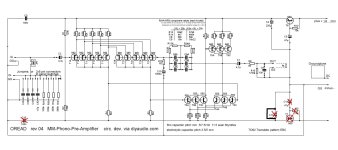
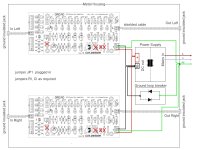
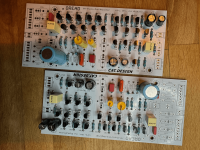
 .
.